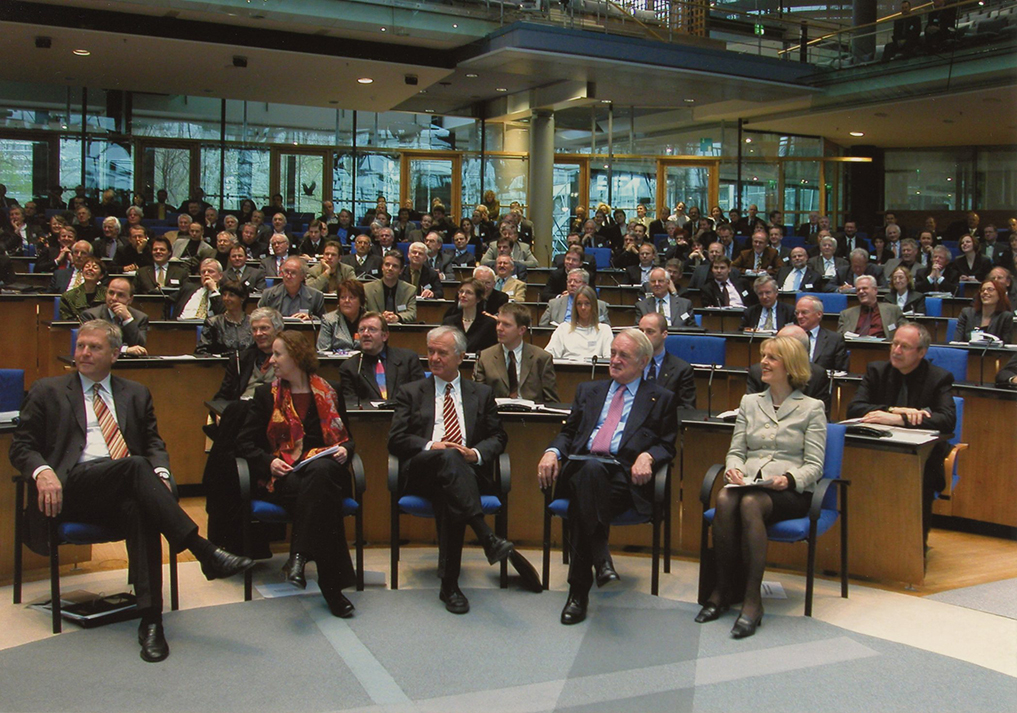Foundation
History
 © Bundesstiftung Baukultur
© Bundesstiftung Baukultur
In February 2017, the art and architectural historian Dr. Anne Schmedding is appointed Deputy Chair of the Federal Foundation of Baukultur.
From 3 to 5 November 2016, the 2016 Convention of Baukultur takes place in Potsdam. Here, the new Baukultur Report 2016/17 “City and Village” will be presented to the public for the first time.
In March 2016, the lawyer Nicole Heizmann is named as the Deputy Chair of the Federal Foundation of Baukultur.
In October 2014, the Baukultur Report is discussed in the German Bundestag and in November it is presented and discussed at the 2014 Convention in Potsdam, “Built Living Spaces of the Future – Focus City”.
In May 2013, the architect and urban planner Reiner Nagel is named as the Chair of the Federal Foundation of Baukultur.
In June 2012, the 2012 Convention entitled “STATTVERKEHRSSTADT” takes place in Hamburg.
In March 2011, Potsdam Mayor Jann Jakobs hands over the new foundation headquarters in Potsdam’s Schiffbauergasse to the Federal Foundation of Baukultur.
In April 2010, the 2010 Convention on the topic of “Baukultur of the Public Realm” takes place at the Zollverein Coal Mine Complex in Essen. The Convention provides a platform for initiating debates on essential topics of interest to Baukultur.
In March 2008, the Federal Foundation of Baukultur takes up residence at its business headquarters in Potsdam, under Chair Michael Braum and Deputy Chair Veronika Brugger. The Federal Foundation of Baukultur develops and implements its own initiatives, event series, and publications, with which it aims to stimulate the public dialogue about Baukultur.
In 2007 the Baukultur Foundation begins its work with the constitution of its expert bodies. The Board of Trustees convenes in its provisional constellation for the first time in March. The positions of the chairpersons are publicly advertised. The Founding Convention of the Federal Foundation of Baukultur is held on 21 September 2007 in Potsdam.
In 2006, the Federal Foundation of Baukultur is established by enactment of law: on 3 May 2006, the German Federal Cabinet votes to pass the bill on establishment of the Federal Foundation of Baukultur, as submitted by Federal Minister of Construction Wolfgang Tiefensee. On 16 June 2006, the Bundesrat welcomes the submitted bill on the Federal Foundation of Baukultur in the first round. The act on the establishment of the Federal Foundation of Baukultur passes the Bundesrat on 24 November 2006 and enters into force as planned on 22 December 2006. After receiving broad bipartisan approval in the German Bundestag, the Federal States also pave the way for the establishment of the Foundation.
In August 2005, the second Baukultur Status Report is released. The foundation act fails in September due to the premature end of the legislative period and the renewed deferment of consultations in the mediation committee: The states block the bill in the Bundesrat and relegate it to the mediation committee. The act on the establishment of the Federal Foundation of Baukultur subsequently fails in this legislative period. After clarification of the federal political situation, the Friends’ Association immediately begins discussions with the new federal government. The establishment of the Baukultur Foundation is included in the coalition agreement between CDU, CSU, and SPD from 11 November 2005.
In 2004, the foundation act is drafted by the BMVBS (Federal Ministry of Transport, Building and Urban Development): The steering committee of the Convention of Baukultur made a substantial contribution to the drafting of the act and, together with the Friends’ Association, prepared for the next Convention of Baukultur. The venue and theme were discussed. In addition, the steering committee developed proposals for foundation instruments and areas of concentration of the Foundation.
In 2003, the first Convention of Baukultur takes place in Bonn. With the support of the BMVBS and of the Friends’ Association of the Federal Foundation of Baukultur (formerly the Friends’ Association of the German Centre for Architecture DAZ), in April 2003 the founding circle organises the convention – and wins the participation of not only several ministers but also the Federal President. A 21-person steering committee is elected from within the Convention.
In 2002, the founding circle gathers: a founding circle of 125 esteemed leading experts is formed in the summer 2002. A proclamation is made in conjunction with the XXI UIA World Congress “Resource Architecture” in Berlin.
In 2001, the first Baukultur Status Report in Germany appears, with recommendations for action regarding the implementation of, inter alia, the establishment of a national foundation for Baukultur: The Federal Government takes a position and promotes the idea of formalising the initiative in the form of the Baukultur Foundation at the federal level. The congress “Baukultur in Germany” is held in Cologne.
In 2000, professional chambers and associations, led by the German Federal Chamber of Architects (BAK) and the Association of German Architects (BDA), address the Federal Ministry of Transport, Building and Urban Development (BMVBS) and pointing to, among other things, activities in other European countries, encourage the establishment of an initiative. Their actions are spurred by the fact that, among other things, the BMVBS has again established its own department for matters of architecture and Baukultur. The BMVBS follows the suggestion and, together with the Federal Government Commissioner for Culture and the Media (BKM) and the professional chambers and nationwide associations of all design professionals, begins the “Initiative Architektur und Baukultur” (Initiative for Architecture and Baukultur). A steering group is formed, which includes representatives of the states and municipalities, the construction, housing and banking industries, and visual artists as well as other institutions in the field of architectural outreach and monument protection: The matters of concern go beyond architecture in a strict sense, also embracing engineering, urban design, standards of good practice in planning and building in their totality – in a single word: Baukultur.
